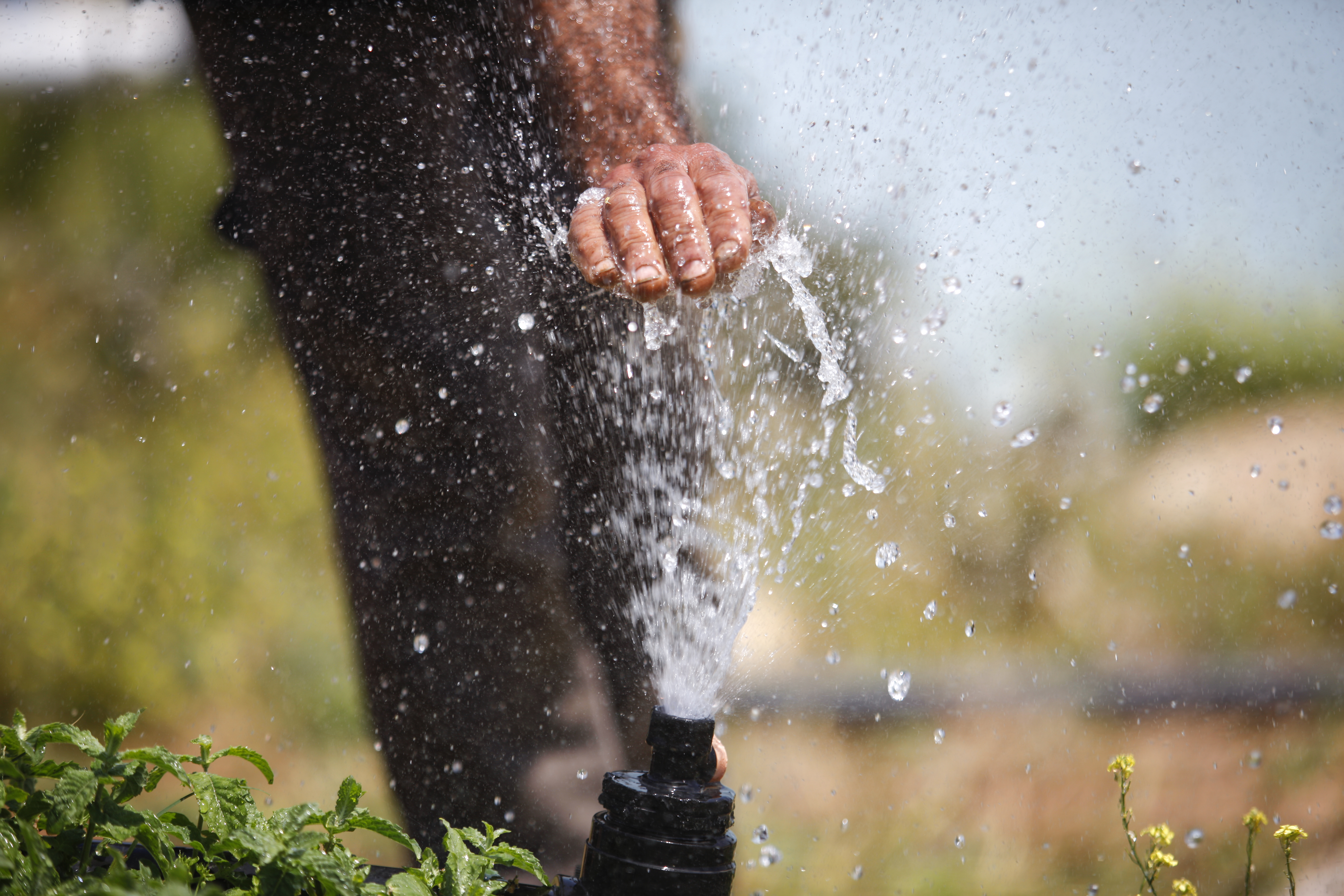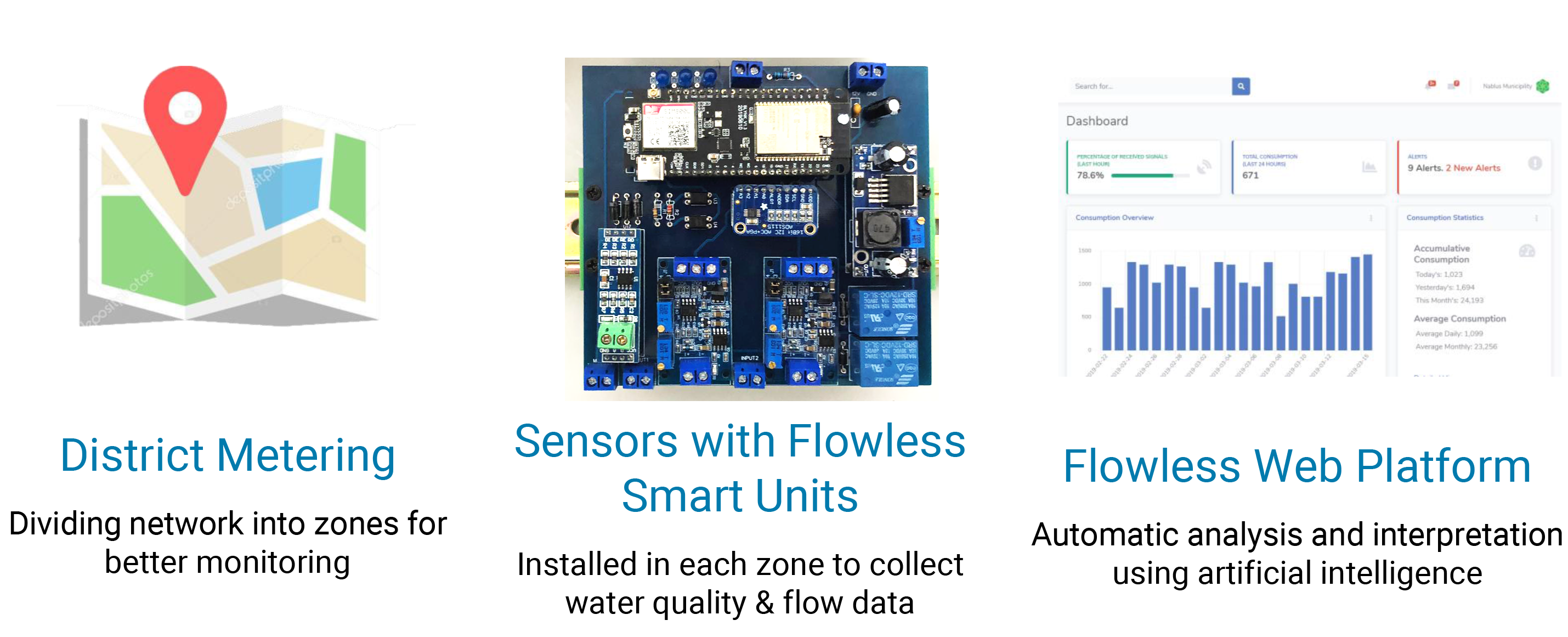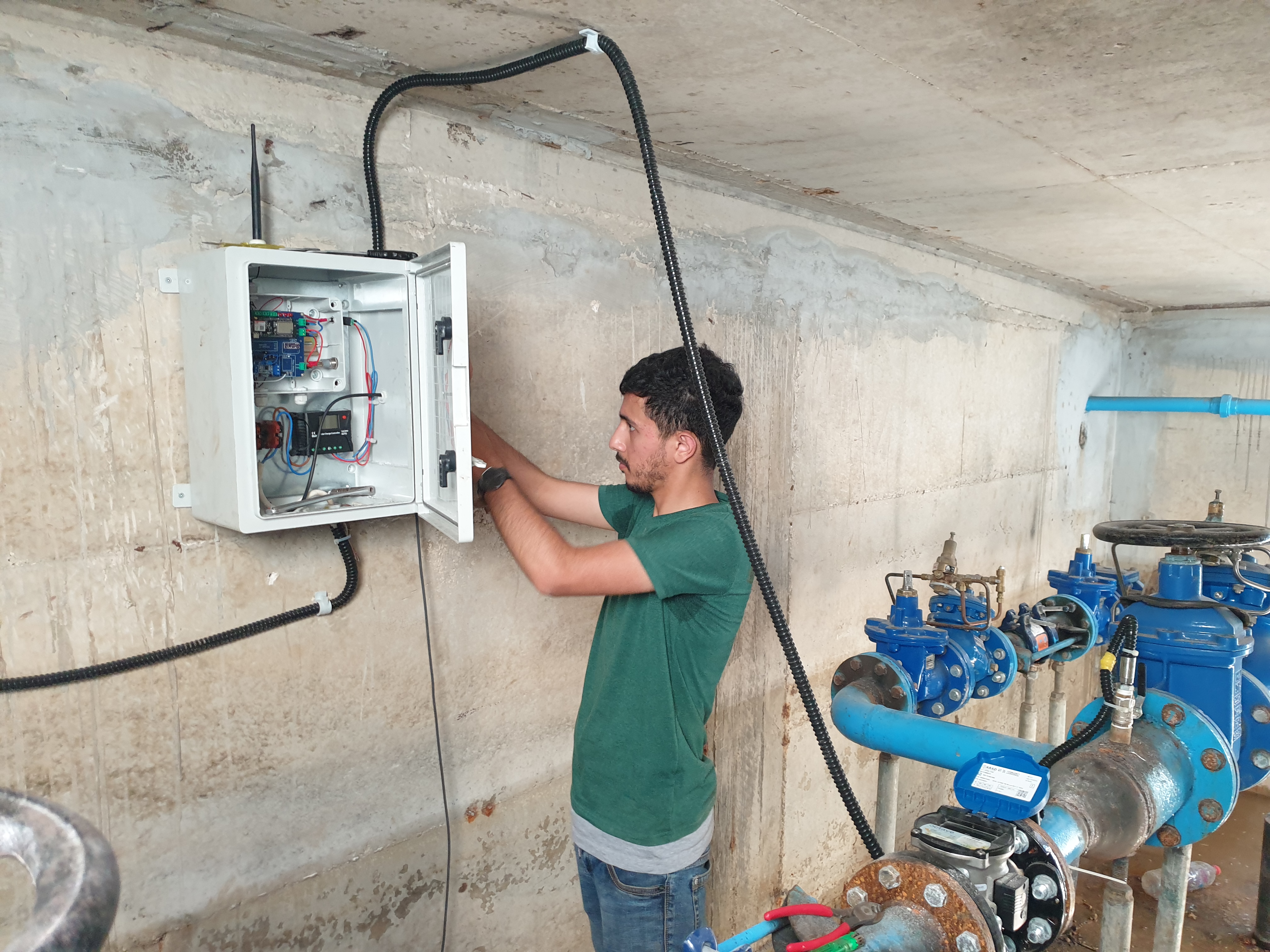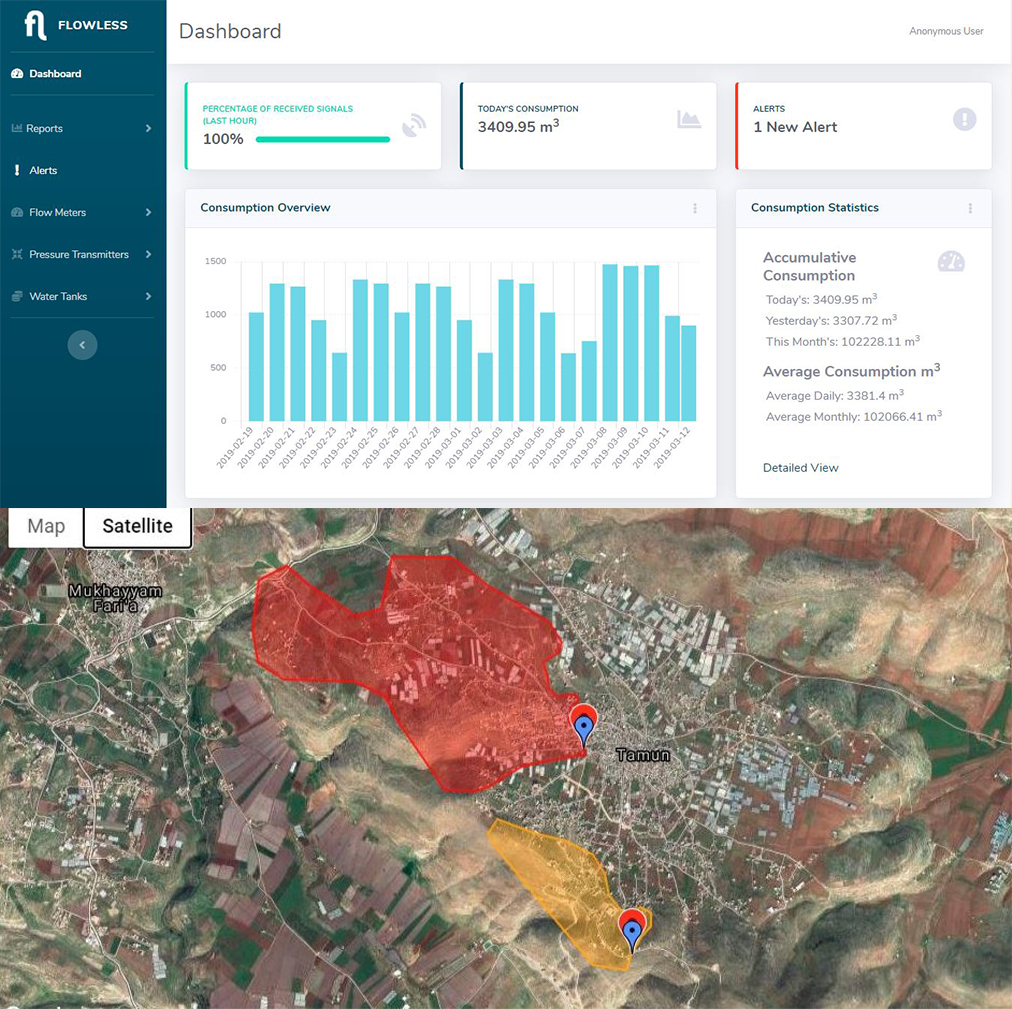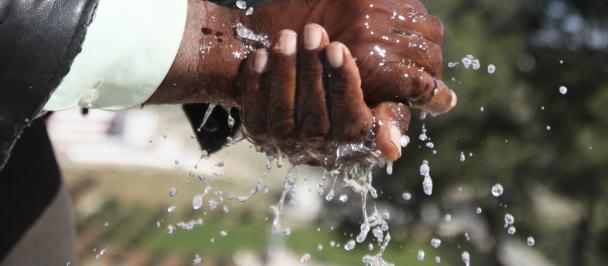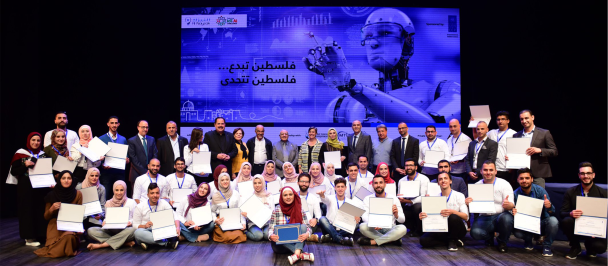Non-Revenue Water and Data: How Palestinian water service providers can foster cost-efficient Internet of Things (IoT) and Artificial Intelligence (AI) technologies to stop water and revenue losses
Detecting Non-Revenue Water Using Internet of Things and Artificial Intelligence
October 9, 2020
©UNDP/PAPP – Ahed Izhiman
One of the major issues affecting water utilities in the State of Palestine, and developing countries, in general, is the considerable difference between the amount of water supplied into the distribution system and the amount of water billed to consumers - or Non-Revenue Water (NRW). NRW is attributed to either real losses related to water leakage during pumping, storage and transmission in network pipes or apparent losses due to theft or illegal connections, metering inaccuracies or unbilled consumption.
According to the Water Sector Regulatory Council (WSRC) in the State of Palestine, the average rate of 33% NRW accounts for US$45 million of more than 85 million cubic meters of fresh water lost annually that would have been utilized to relieve part of water scarcity and insufficient supply. Most of these losses are borne by water service providers, impacting their financial viability, operational performance and the quality of service delivery. Traditional approaches to leak detection require large capital, human and financial investments that Palestinian service providers, either local government units or joint service councils, cannot afford and tend to rely on donor-supported rehabilitation projects. These projects normally address real losses and, in many cases, fail to provide a comprehensive solution to the problem as apparent losses, which can be higher than real losses and more difficult to detect, require constant monitoring, even in newly constructed or rehabilitated networks.
Another important aspect that exacerbates water losses is the manual handling and analysis of monitoring data of the public water networks. This introduces a high probability for human error and an additional workload on staff managing water services; many of which lack the required tools, capabilities or skills to perform such complex analyses.
Detecting NRW using Internet of Things and Artificial Intelligence
Smart data-driven methods for detecting water losses in public networks are becoming very popular. Such solutions are based on the application of the Internet of Things and Artificial Intelligence (AI) techniques, whereby “AI” algorithms are trained with large real-time flow and pressure datasets collected through smart meters. “AI” is then used to extract information, validate hydraulic models, detect patterns and highlight anomalies. This helps service providers narrow the search area for losses within large public networks and make evidence-based and timely decisions for corrective actions, thus saving time and resources invested in reducing Non-Revenue Water (NRW).
Accelerator Lab Experiment
The UNDP/PAPP’s Accelerator Lab partnered with a promising start-up company, FlowLess, to test a locally developed and cost-efficient smart system for detecting water losses using IoT and AI, supported with a customized web-platform. The start-up team brings together four talented young innovators and experts in water engineering, mechatronics and software development. This locally developed solution is envisioned to assist water service providers to accurately collect data and provide rigorous analysis on the status, sources and location of leakage or losses in public water networks. This solution also helps service providers monitor water networks remotely during times of crises when movement is restricted. The experiment was conducted in selected areas in Tammun and Ras Al Far’a in Tubas governorate in the West Bank. The Accelerator Lab and FlowLess collaborated with the Tubas Joint Service Council for Water and Wastewater (JSCWW), who showed a high sense of ownership and support for this experiment, which is key for the uptake and sustainability of the solution.
The Accelerator Lab acknowledges that similar solutions are provided by global companies specialized in water management; however, the challenge resides in affordability, especially that integrated smart water management systems are very expensive, and in many cases, service providers purchase or install part of the system. Experts in this field also explained how these solutions require large investments in updating the existing water infrastructure to comply with the smart system requirements, not to mention the costly maintenance, web-platform subscription, update fees, difficulty in accessing on-the ground technical support, and following-up post installation.
The experiment with FlowLess was designed to test whether this locally developed solution can address these challenges and provide an alternative sustainable, affordable and flexible smart water management system that can be adapted to water networks’ infrastructure, whose technology and complexity vary across Palestinian communities. Most importantly, The Accelerator Lab wanted to showcase through a field demonstration how a local private enterprise that is committed to social impact can assist and collaborate with local government units and joint service councils in addressing NRW. The water sector is crippled with complex challenges, and efficient management is key to maintain quality service delivery to citizens, and such unusual partnerships could foster solutions that would have otherwise been unattainable.
The experiment with FlowLess was designed to test whether this locally developed solution can address these challenges and provide an alternative sustainable, affordable and flexible smart water management system that can be adapted to water networks’ infrastructure, whose technology and complexity vary across Palestinian communities. Most importantly, The Accelerator Lab wanted to showcase through a field demonstration how a local private enterprise that is committed to social impact can assist and collaborate with local government units and joint service councils in addressing NRW. The water sector is crippled with complex challenges, and efficient management is key to maintain quality service delivery to citizens, and such unusual partnerships could foster solutions that would have otherwise been unattainable.
The smart system was successfully installed, and the web-platform was launched with a user- friendly dashboard and real-time monitoring reports and alerts based on continuous training of the AI model. FlowLess’ follow-up, commitment and openness to further customize their solution based on feedback and recommendations were indispensable in gaining the trust of the joint service council in their services, who also expressed their willingness to expand this experiment to cover larger parts of the network in Tubas. This is only the beginning for Tubas JSCWW in realizing the full potential of this solution. The lifeblood of the AI model is big real-time data feeding into machine learning to improve model accuracy and respective alerts. The IoT component and AI will be merging into a synergistic relationship and over time, less effort will be required for field inspection and verification by the joint service council staff, and a significant reduction in NRW is expected.
Growing the Solution to Scale-up
FlowLess has a long journey to further improve their solution, especially in more complex networks to bring it to scale with other service providers in the State of Palestine, and other neighbouring countries facing similar challenges in the water sector. The Accelerator Lab believes that positive experience of the early adopters will advocate for solution uptake. This was evident when the Tubas JSCWW recommended the solution to other service providers, who already reached out to FlowLess to replicate this experiment. The Accelerator Lab, in collaboration with the Water Sector Regulatory Council (WSRC), will continue to disseminate the results of this experiment with relevant actors in water sector development in the State of Palestine. The WSRC will be advocating for this solution as it will also help service providers to accurately and timely report on water sector performance indicators- including NRW- instead of estimations based on annual water balances without understanding the root causes of underperformance. The Accelerator Lab will follow up with Tubas JSCWW to see if they will act upon the new system’s intelligence reports and alerts by taking immediate actions to reduce NRW.
UNDP/PAPP’s environment and natural resources team were closely following the Accelerator Lab experiment and will use FlowLess’ smart system for digitizing flow meters as part of the transboundary wastewater management project, implemented in partnership with the Palestinian Water Authority. This locally produced solution not only has the potential to preserve an invaluable resource, but could play a significant role in improving water governance in the region if scaled-up.
Globally, an increasing number of water service providers are addressing NRW management through public-private partnership (PPP) contracts known as Performance-Based Contracts. This innovative contract mechanism would be one of the models FlowLess and other Palestinian water solutions’ start-ups would adopt to foster partnerships with water service providers. This will require optimizing incentives and allocating risks to the party accountable to bear or mitigate it – a win-win situation for both service providers and water solutions’ companies.
Do you think this model would work in the Palestinian context and other countries in the region with cost-competitive local solutions? or would the ingrained donor dependency mentality prohibit service providers from investing now in such PPPs to save millions of dollars annually and protect such as precious resource for the Palestinian people? We look forward to hearing your thoughts!
*********
Ensuring the availability and sustainable management of water and sanitation for all is the sixth Sustainable Development Goal (SDG6) and a top national priority for the State of Palestine as per the National Water Sector Strategic Plan (2017-2022).The water supply is largely regulated through negotiated agreements with Israel for groundwater abstraction and importing of additional supply. Palestinians only have the rights to access 20% of the water in aquifers compared to an 80% share by Israel, along with full control over surface water resources of the Jordan River and Dead Sea. As such, many Palestinians survive on only 78 litres per capita per day and consumption as little as 20 litres per capita per day in communities in Area C of the West Bank; an amount considerably less than the World Health Organization’s recommended water consumption guidelines of 120 litres per capita per day.

 Locations
Locations